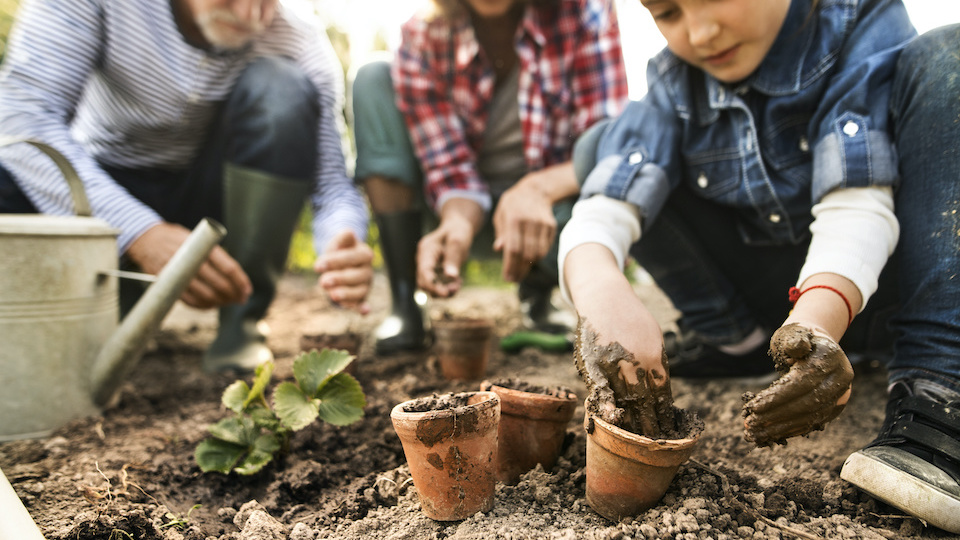For avid gardeners, this will come as no surprise…Gardening is a major stress reliever. Being outdoors, nurturing new growth, creating something with your hands, being productive; these are all ways that growing plants and maintaining a garden reduces stress and promotes relaxation.
Working in the Garden Relieves Stress – Here’s the Proof
Gardeners already know this, but the proof is in the research. Many studies of gardening and outdoor work have shown that you can see real results in stress reduction when you engage in gardening as a hobby:
Time spent in nature lowers cortisol. One reason that gardening reduces stress is that it gets you outside in nature. Japanese studies have shown that even just 30 minutes spent outdoors in the woods significantly lowers cortisol levels in the body. This is the hormone associated with increased stress. Time in nature also reduces heart rate and blood pressure, physical signs of lower stress.
Gardening as a distraction. Gardening can help lower your stress by serving as a distraction from worries. Thoughts about work, relationship difficulties, money problems, and other stressors melt away when the brain is distracted. One study involved 12 weeks of gardening for people struggling with depression. The participants reported that gardening helped them stop obsessing over their problems and worries. After three months, their symptoms had improved.
Gardening mitigates a stressful situation. In another study, participants performed a task considered to be stressful. Half of the group then read for 30 minutes in their gardens, while the others worked their gardens. Both reported improved moods, but the results were much stronger in the group that worked in the garden. Those that only read in the garden experienced a deterioration in mood and return of stress, while those who gardened felt completely restored.
Manage work burnout with gardening. The primary source of stress for many people is related to work. People work long hours and feel pressured to perform, which can lead to stress and burnout. A study of nurses, who are especially prone to burnout, found that work breaks in a garden helped. Those who spent time in the garden after six weeks had better scores on tests of emotional exhaustion. The time outdoors helped mitigate the stress of work and restored the nurses to better face responsibilities without getting burned out.
Gardening improves many aspects of health. When you feel better and are healthier, you can be more resilient in the face of stress. A review of multiple studies of gardening effects found that people who garden score higher on many health tests. Gardeners have less depression, anxiety, and stress; they have healthier weights and body composition; they experience greater life satisfaction and enjoy a greater quality of life; and they have a better, more satisfying sense of community.
These are just some of the proven ways that gardening reduces stress, according to scientific studies. What avid gardeners also know is that time spent working in the garden provides a sense of accomplishment, a reward for a job well done when you see plants thrive. It takes you away from your smartphone, email, and social media. Gardening helps you connect with other people, and it is a creative activity. All of these factors make gardening an antidote to stress.
Have Limited Outdoor Space? No Problem
Even city folks and apartment dwellers can get the stress-busting benefits of gardening. Just a few pots on a balcony or houseplants can provide you with the benefits of tending to plants. Gardening in limited space even has the added benefit of forcing you to stretch your creativity. Try these ideas or come up with your own:
- Grow a container garden on a balcony or indoors. Herbs and flowers are excellent choices for boosting mood with scents.
- You can also grow some vegetables indoors or in a small space. Try microgreens or a tomato plant.
- A small Zen garden can help you meditate or be more mindful of reducing stress.
- Tending to a bonsai tree is a lifelong project that many people find soothing.
- Join a community garden in your neighborhood. Many need volunteers to help, and you’ll get to take home some of the produce.
- If there is no community garden in your area, talk to your city about starting one.
- If you don’t feel you have the time to start gardening now, spend free time in a local park.
Don’t Let Gardening Add to Stress
Gardening is overwhelmingly good for your mental health, but this hobby can become a stressor. A small study of medical students who tried gardening to relieve some of the stress and pressure associated with school found that most enjoyed the experience. A few, though, found gardening added stress.
So, what’s happening with those students? There may be a few things at work, all avoidable if you approach gardening with the right attitude:
- Set reasonable expectations. A garden could be stressful if you’re expecting perfection as a beginner.
- Accept failure. Putting time into plants only to watch them succumb to disease or drought is frustrating, but some failure in gardening is inevitable.
- Garden on a budget. This can be an expensive hobby if you let it, but budget gardening is possible. Save and share seeds; share cuttings; make your own compost; and take other measures to reduce costs.
- Start small. If you are new to gardening, start small to avoid getting overwhelmed. Gardening can become a chore if it’s more than you can handle.
The benefits of gardening on mental and physical health are numerous. Relieving stress may be the most important of these. Spend some time outside, tending to plants, growing your food, and just enjoying nature, and you’ll quickly see the effects on your sense of well-being.
-Mary Ellis




